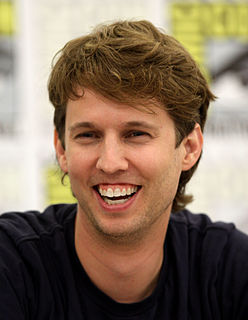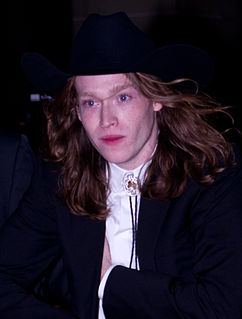A Quote by Ayn Rand
There’s nothing as significant as a human face. Nor as eloquent. We can never really know another person, except by our first glance at him. Because, in that glance, we know everything. Even though we’re not always wise enough to unravel the knowledge.
Related Quotes
Suppose that we are wise enough to learn and know - and yet not wise enough to control our learning and knowledge, so that we use it to destroy ourselves? Even if that is so, knowledge remains better than ignorance. It is better to know - even if the knowledge endures only for the moment that comes before destruction - than to gain eternal life at the price of a dull and swinish lack of comprehension of a universe that swirls unseen before us in all its wonder. That was the choice of Achilles, and it is mine, too.
No one knows what he himself is made of, except his own spirit within him, yet there is still some part of him which remains hidden even from his own spirit; but you, Lord, know everything about a human being because you have made him...Let me, then, confess what I know about myself, and confess too what I do not know, because what I know of myself I know only because you shed light on me, and what I do not know I shall remain ignorant about until my darkness becomes like bright noon before your face.
Even when I detach, I care. You can be separate from a thing and still care about it. If I wanted to detach completely, I would move my body away. I would stop the conversation midsentence. I would leave the bed. Instead, I hover over it for a second. I glance off in another direction. But I always glance back at you.
One of the peculiar ironies of being a human self in the Cosmos: A stranger approaching you in the street will in a second's glance see you whole, size you up, place you in a way in which you cannot and never will, even though you have spent a lifetime with yourself, live in the Century of the Self, and therefore ought to know yourself best of all.
There's always mixed feelings about the work that I do. When you're playing a real person, that's another kind of responsibility. I have to say that every time that I have played a real person, even though I gave it everything I could, I feel like I misinterpreted trying to represent them. All the time I feel like I screwed it up! But I don't know if that's because I can't separate myself from it enough.
The glance is natural magic. The mysterious communication established across a house between two entire strangers, moves all the springs of wonder. The communication by the glance is in the greatest part not subject to the control of the will. It is the bodily symbol of identity with nature. We look into the eyes to know if this other form is another self, and the eyes will not lie, but make a faithful confession what inhabitant is there.
You would be very ashamed if you knew what the experiences you call setbacks, upheavals, pointless disturbances, and tedious annoyances really are. You would realize that your complaints about them are nothing more nor less than blasphemies - though that never occurs to you. Nothing happens to you except by the will of God, and yet [God's] beloved children curse it because they do not know it for what it is.
Rain Man certainly didn't test really well. If you look at it carefully, you have a disease autism they didn't understand back then, they didn't know in the test audience whether it's okay to laugh or not laugh, because it's a film that's done in a way where, "Well, maybe I'm not supposed to laugh." At the end of the film, Dustin Hoffman gets on the train and doesn't even acknowledge his brother. Not even a glance, nothing. That's why the studio said, "Can't you just have him look at Tom Cruise at the end of the film?"




































